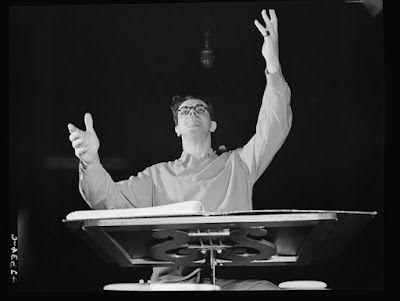Many choir leaders over-conduct in concerts.

But if you’ve done the work in rehearsal, you should hardly need to conduct at all.
Choir leaders who are starting out, or those who lead non-auditioned community choirs often conduct too much in concerts.
Partly this is due to fear (“The singers may get it wrong, so I need to signpost everything very clearly”), partly due to lack of trust (“The singers need me, they can’t do it on their own”), and partly because the choir is under-rehearsed.
The latter is something we can all relate to: there never seems to be enough rehearsal time to properly prepare for the next concert.
Rehearsals are where all the work is done. It’s where the choir leader points out the dynamics, structure, vocal qualities needed, how the harmonies fit together, where singers will be standing, and so on.
In rehearsal there will be plenty of stopping and starting and “over-conducting”: clearly indicating with large gestures when, where and how things happen.
If all that work has been done thoroughly, then in concert the conductor will only need a few minimal gestures (if at all) to guide the singers through each song.
A wonderful example of this is Leonard Bernstein conducting Haydn Symphony no. 88. He starts the ensemble off and then essentially conducts them (or responds to their playing?) with small facial gestures. All the conducting work was done in rehearsal.
This can also happen with choirs. In a recent Facebook post, Stephen Taberner attempted to describe the feeling of conducting the Spooky Men’s Chorale. It was a moment when he felt that the singers as a group were flying, and when they fly he is no longer driving, but the song itself is in control.
That, surely, is what we, as choir leaders, should be aiming for in performance.
other posts of interest
You might find these older posts relevant too:
Your job as a choir leader is to disappear
Choir leaders, are you doing too much for your singers?
How to use gestures to conduct your choir effectively
Chris Rowbury
Get more posts like this delivered straight to your inbox!
Click to subscribe by email.
… found this helpful?
I provide this content free of charge, because I like to be helpful. If you have found it useful, you may like to ...
... to say thank you.
